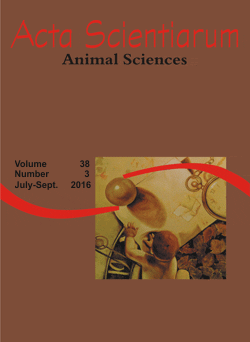<b>Carcass yield, sensory analysis and meat quality of broilers fed canola meal
Resumo
This study aimed to evaluate the effect of dietary levels of canola meal on carcass yield, fatty acids profile, physical characteristics, chemical and sensory composition of breast meat of broilers. A total of 300 one-day-old, both sexes, Cobb broilers were assigned to a completely randomized design with five treatments and six replicates of ten birds each. Birds were given 0, 25, 50, 75 and 100% canola meal in place of soybean meal in the diet. After 42 days, four birds per replicate were slaughtered to analyze the carcass yield and the breast was used for analysis of fatty acid profile, sensory analysis and chemical and physical composition. The fatty acid profile was influenced by increasing levels of canola meal, decreasing (p < 0.05) the content of saturated fatty acids and linoleic acid, and increasing (p < 0.05) the content of linolenic acid. In the sensory analysis, the residual flavor became stronger (p > 0.05) with 100% replacement and the hardness decreased (p < 0.05). Canola meal can replace soybean meal up to the level of 25% without affecting carcass yield and chemical, instrumental and sensory analysis of meat.
Downloads
DECLARAÇÃO DE ORIGINALIDADE E DIREITOS AUTORAIS
Declaro que o presente artigo é original, não tendo sido submetido à publicação em qualquer outro periódico nacional ou internacional, quer seja em parte ou em sua totalidade.
Os direitos autorais pertencem exclusivamente aos autores. Os direitos de licenciamento utilizados pelo periódico é a licença Creative Commons Attribution 4.0 (CC BY 4.0): são permitidos o compartilhamento (cópia e distribuição do material em qualqer meio ou formato) e adaptação (remix, transformação e criação de material a partir do conteúdo assim licenciado para quaisquer fins, inclusive comerciais.
Recomenda-se a leitura desse link para maiores informações sobre o tema: fornecimento de créditos e referências de forma correta, entre outros detalhes cruciais para uso adequado do material licenciado.








































